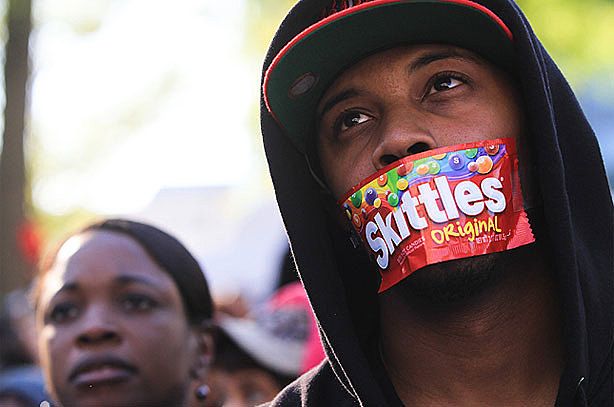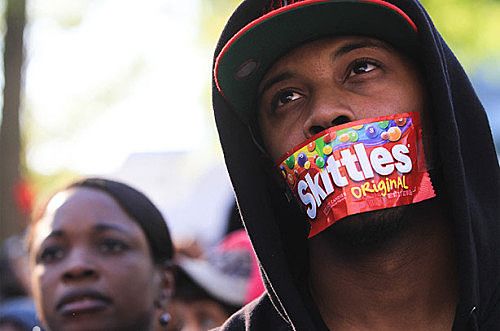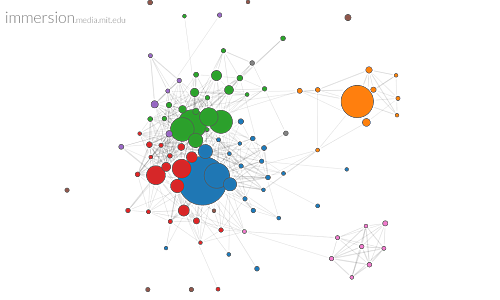Internet Histories | 22 July
This fortnight: the Zimmerman verdict, tweeted indulgences, herald lead stories, Jay-Z's latest, calling a transphobic spade a spade, drinking in Antarctica, mining one's own gmail metadata and summoning Cthulhu - with chemistry!
This Fortnight:
The Zimmerman verdict | Tweeted indulgences | Herald lead stories | Jay-Z's latest
Calling a transphobic spade a spade | Drinking in Antarctica
Mining one's own gmail metadata | Summoning Cthulhu - with chemistry!
Maddie
In the wake of the George Zimmerman verdict, for reasons of self-care, I tried to avoid reading pretty much anything except the outpouring of grief on my twitter feed. I knew there were pieces emerging about how the verdict was “technically correct”; I knew there were people concern-trolling the message and tone of protesters (expected to be “rioters”); and I knew there were people who were openly celebrating with jubilant, fuckfaced glee. I ignored all of it. In a moment of weakness, though, I reached down into the swampy detritus at the base of the discussion, plucked out this article, and read it.
The piece is called “You Are Not Trayvon Martin” and it comes courtesy of William Saletan, who has previously defended both racial IQ differences and Dominique Strauss-Kahn, and whose twitter bio reads “When people say 'Don't go there,' I go there.” Let it be known, then: this is a brave purveyor of unpopular views in the name of rational, right-thinking debate. JUST KIDDING this guy is a feckless regurgitator of racist narratives and his article is undiluted garbage. You can tell that the article is fetid right from its lede, which is “[Travyon Martin’s] death wasn’t about race, guns, or your pet issue.” Here are some of Saletan’s reasons that this case was not about race:
The initial portrait of Zimmerman as a racist wasn’t just exaggerated. It was completely unsubstantiated. ... Some* of the people Zimmerman had reported as suspicious were black men, so he was a racist. Members of his family seemed racist, so he was a racist. Everybody knew he was a racist, so his recorded words were misheard as racial slurs, proving again that he was a racist.
Well, no. Whether this case is about race doesn't turn on whether George Zimmerman is a racist. For a start, no-one is A Racist these days: the label carries too much stigma, even though the words and actions which constitute racism don’t. That's why you hear people say "I'm not a racist, but [classic, textbook exemplar of racism]”. Action rather than intent is what matters here: Zimmerman may not use racial slurs or identify as racist, but he did stalkand kill ablackkidwhowasdoingnothingwrong. And Zimmerman lives, as we all do, in a world that conditions white people to see black men as threats; that conditions white people to view certain spaces (like gated communities) as rightly white-only (or, specifically, black-free); that conditions white people from birth to devalue black bodies in a multitude of subtle and unsubtle ways, whether or not they realise it. Racist stereotypes lurk in the brains of white people by default and require a lifetime of active, deliberate reprogramming to remove: they necessarily informed how Zimmerman responded to Martin; they necessarily informed what counted as “reasonable” to a bunch of white jurors. To insist, then, that this case had "nothing to do with race" is naive optimism at best and mendacious horseshit at worst.
The article also grates because it victim-blames and casually smears the character of Trayvon Martin. I’m not talking about victim-blaming in an abstract sense: Saleman actually says that Martin’s “phobic misreading of Zimmerman” was a “wrong turn” that led to his death. He notes that “the evidence didn’t fit the portrait of Martin as a sweet-tempered child” (MARTIN DIDN’T NEED TO BE A SWEET-TEMPERED CHILD HE WAS BEING FATALLY PURSUED BY A CREEPY-ASS CRACKER) and makes much of the fact that Martin described Zimmerman as a “creepy-ass cracker” (which he was.) Saleman compares the anti-black prejudice Zimmerman held against Martin with the anti-white prejudice Martin held against Zimmerman, as if both are equally unjustifiable and capable of causing the same harm. If this is a view that strikes you as reasonable, consider which of these two prejudiced individuals ended up dead and which of them walked. Then consider how often that pattern repeats.
That, really, is the essence of what’s wrong with this article: it’s a Golden Mean Fallacy, both-sides-are-just-as-bad comparison of like with not-like. To Saleman, calling a white person a “creepy-ass cracker” is like the prejudice that causes one to stalk and kill a black teen (“Martin, meanwhile, was profiling Zimmerman"). To Saleman, people who are protesting the verdict are like Zimmerman himself (“They’re oversimplifying a tragedy that was caused by oversimplification”). To Saleman, accusing someone of being a racist is like actually being racist (“It’s a case study in how the same kind of bias that causes racism can cause unwarranted allegations of racism").
If you want to prevent the next Trayvon Martin tragedy, learn from their mistakes. Don’t paint the world in black and white. Don’t declare the whole justice system racist, or blame every gun death on guns, or confuse acquittal with vindication.
Actually, pretending that this has “nothing to do with race” or that it’s unreasonable and histrionic to label the justice system racist is a damn good way to ensure the next Trayvon Martin tragedy. Fuck this guy and his dumb article, the end.
_________
* The article Saletan links here says “almost all”, not “some”.
Matt
There never was such another skilfull Pardoner;
For in his bag he had a pillowcase,
Which he said was Our Lady's veil:
He said he had a piece of the sail
That Saint Peter used when he went
Out to sea, ‘til Christ brought him back.
He had a metal cross set with stones,
And a eucharist container (filled with pigs' bones);
But with these relics, whenever he found
A country Parson, far from town
Then on that day he'd make more money
Than the Parson in twelve months.
- Translation of part of Chaucer’s General Prologue.
Chaucer’s Canterbury Tales sets the standard for zany hijinks, framed narratives, and Chaucer’s own incomparable love of butts. It also introduces the figure of the Pardoner (for my money, he tells the creepiest story of the lot), who sells off fake bits of Christian iconography to the credulous in exchange for granting them time off purgatory after they die. I always considered his profession more allegory than actuality, but it turns out Catholics – or at least the Catholic hierarchy – still reckon you can get significant time off limbo for performing certain earthly deeds.
For example, last week the Vatican announced that for following the Pope on Twitter, you get to spend less time in purgatory. The exact amount of time isn’t mentioned, but one presumes it would increase with the number of Popetweets you favourite or retweet. Now, obviously there’s a bit of a catch:
"You can't obtain indulgences like getting a coffee from a vending machine," Archbishop Claudio Maria Celli, head of the pontifical council for social communication, told the Italian daily Corriere della Sera.’
That fact that the Vatican has devoted the time of an Archbishop to social media communication is only the second-best thing about the above quote; the first-best is the Archbishop’s shorthand for ‘decadent instant gratification’ is vending machine coffee, a thing I had no idea existed.
Irreverence aside, the story linked to from the Guardian, above, is technically correct, but probably places emphasis on the wrong part of the Vatican’s pronouncement. Coming in the lead-up to World Youth Day, the announcement simply confirmed that those who can’t afford to make it to Brazil, where Pope will be, are nevertheless still able to receive his Papal indulgences via other channels of communication (Twitter, etc). The Catholic Church actually has a fairly strong history for this: the devout have been able to receive blessings by tuning in their radios and televisions for many decades, and most indulgences simply require the recitation of a prayer on the part of the devotee. The Church has come a long way since Chaucer’s day – though all the socially mediated Archbishops in the world still probably don’t mean much to the gay Catholics living in 'sin'. And how about that birth control?
There are also many other indulgences you can receive at home, for actions like abstaining from things you enjoy doing, visiting a cemetery or doing charitable work. If you’re travel-inclined, you can also visit Rome and walk up the Sacred Steps at the Vatican on your knees. I’ve actually done this and found it somewhat tedious and painful, but then I get seven years off purgatory so… maybe worth it?
*
It seems like every second time I visit the Herald’s website there’s a glaring error in their lead story. I know this is simple confirmation bias, but this weekend there were two errors in the same tragic lead:
According to the Herald, death is a ‘critical condition.’ They seemed to realise the error, and a few minutes later attempted a correction:
This is a simple copyediting issue, which is somehow even more frustrating. Also worth noting is the ludicrous image they’ve decided to go with. The toddler wasn’t even hit with a police car, let alone one accelerating to warp speed. Is this some weird presupposition of negligent manslaughter? They’ve since updated the story with a rather more sensible ambulance photo.
Adam
I listened to Magna Carta Holy Grail for the first time last week. It bored me. Jay Z's sticking faithfully to the path he's been plodding down since Kingdom Come, all laboured allusions to fine art, one-percenter braggadocio and brief, pointed references to African American history and contemporary politics. But it bored me. It feels safe. Restrained. Dull. The beats are ornate but unimpressive; the lyrics, familiar; the flow, managed. For a man rapping about injustice, Hov wasn't very angry; for a man rapping about the life he lives and family he loves, Hov wasn't very animated.
Chris Richards at the Washington Post better articulated my problems with the album:
Throughout “Magna Carta,” the 43-year-old pretends he’s a threat to a system he’s so eagerly become a part of, as if his life as a champion capitalist is some perpetually escalating act of subversion. Hooray? Rooting for this man in 2013 is like rooting for Pfizer. Or PepsiCo. Or PRISM.
Plus, all of this Samsung hullabaloo has only distracted listeners from the fact that, musically and lyrically, “Magna Carta” is one of Jay-Z’s blandest offerings. Over 16 joylessly professional tracks, our hero laces up his sneakers for his bazillion-thousandth victory lap around the hip-hop universe. There’s no mood, no verve, no vision to this music. It’s the sound of champagne being sprayed around an empty locker room.
To Richards, the self-appointed Greatest Rapper Of All Time is little more than a corporation - or, as he suggests with his sadly appropriate PRISM comparison, an institution. It's not criticism isolated to Jay Z's obscene wealth, mind, nor is it criticism isolated to fear of change. Jay Z's identification with the customs and organisations that define modern society is not some left-field revelation, and it's not even like he's the only one who does it. Magna Carta Holy Grail is just a particularly naked push towards that identification, from the double-barrelled album title to the name-dropping of Caesar, the Pope and Oxford University.
In that context, Magna Carta Holy Grail isn't so much a victory lap as it is a reassertion of Jay Z's dominance in the marketplace of ideas. He's an agenda-setter now, though the agenda he's setting is limited to The Carter Dynasty Is All You Care About (Also Basquiat Is Pretty Cool Eh). But Jay remains a dominant force in the rap industry the same way Will Smith remains a dominant force in movie-making - through stagnation and a refusal to take risks. The fastest way to become a giant is to take the path of least resistance. Nothing in Magna Carta Holy Grail is there to provoke, to incite, to inspire. It's conventional, because you can't be an institution when you're unconventional.
It's hard to root for institutions, though. Especially institutions that resist change. People start asking questions about why we keep them around.
*
[caption id="attachment_7550" align="aligncenter" width="500"] GTA V Trailer Comments[/caption]
Last month, essayist Samantha Allen published An Open Letter to Games Media, an impassioned call to the editors of all gaming sites to do something about the noxious weeds of bigotry, endemic in gamer culture, that were choking the life out of the communities built around their sites. She got results - Stephen Totilo at Kotaku and Steve Butts at IGN drew up new community policies shortly after. That letter led me to Allen's blog and to her sizable collection of games writing, much of which is worth the read. My favourite piece at the moment is this clever accessible piece on using difficulty levels in Halo as a way of teaching intersectionality.
Fast forward to a couple of weeks ago, to Allen's short essay CounterPunch and the War on Transgender People, a response to the media coverage of Radfem 2013. Radfem, an annual radical feminist conference, had been having trouble finding a venue, mainly because the people running the venues they'd asked weren't especially comfortable playing host to a conference they viewed as discriminatory, even hateful, towards trans* women. Forbes and CounterPunch stepped in to bat for Radfem, who felt that these rejections constituted a form of silencing (the Forbes article comes with the added gallows humour of a writer confounded by interviews). Allen responded as follows -
Forbes bought into this sob story wholesale. And even the leftist publication CounterPunch has felt the need to cover “both sides” of the issue in a series of articles that debate the legitimacy of transgender identity as if we were theoretical abstractions and not human beings. There are not two sides to a debate about whether a group of people should exist.
Allen's response is angry and uncompromising, as it should be - it's baffling and disgusting that a trans* woman should be forced into the position of arguing for the legitimacy of her own identity, experience and basic humanity. But Allen also provides in that response a short backstory for one outspoken member of Radfem, Catherine Brennan, whose well-documented attitude towards the transgender community could politely be described as antagonistic. Brennan's reaction?
Catherine Brennan, whose views are critiqued in the essay as being transphobic, has instructed her lawyer David Diggs to prepare litigation against Jacobin magazine.
It's like rain on your wedding day.
*
Here's a couple ofblog posts about drinking culture in Antarctica. Because you can never have too many people ragging on Export Gold -
As bartender that year, I was paying attention to our consumption rates and what things ran out when (something not done before, it seems) and, frankly, it wasn’t complimentary. Remember for this timeline, South Pole Station opened on October 30th with first flight and the station closed on February 14th, with several resupply flights coming in per day while the station was open:
- Ran out of Dr. Pepper & Mountain Dew in late March
- Ran out of red wine in early April.
- Ran out of Coke & Pepsi in mid to late April
- Ran out of Diet Coke & Pepsi, 7-Up, and root beer in early to mid May
- Ran out of tonic and Bailey’s Irish cream in July
- Ran out of Crown Royal, Bacardi 151 and club soda in August
- Ran out of all beer except the worst one (New Zealand’s Export Gold) by early September.
- Ran out of Export Gold the night before first flight arrived and the station opened.
Rosabel
I really love the idea of mining my own data. If there's gonna be one positive outcome of constantly archiving my own existence, it's this. I want to run analyses so I can, I don't know, figure out how my sleeping patterns correlate with my spending habits, and how this is moderated by post-work wine consumption or the people I've interacted with on any given day, so I know when to cut my own credit line (one of the lasting memories I have from studying marketing is learning the ways you can exploit the link between consumer exhaustion and overspending, which I feel horrible even writing).
That's all a little way off though, so in the meantime I've contented myself with Immersion and Gmail Meter. Both require a Gmail account, but that's most people, right? (Reminded right now of that moment in Girls - "People are different. Like you were with George for a very long time and he's still on Hotmail.")
Immersion takes information (to, from, date) from every email you've sent to create a customisable infographic of the people you connect with and how they're related (the bigger the circle, the more you email them):
They also offer simple (terrifying) analyses and forecasts of the number of emails you've sent and received (mine says I'm going to send 5,000 emails this year - "Is that normal for a girl my age?") and how many new people you're connecting with, by year.
Gmail Meter takes this analysis one step further, sending weekly summaries of your email activity. In addition to basic stats, it graphs your traffic (emails sent and received by day and time of day) and your word counts, as well as generating wordles based on your email content. It also calculates response times:
[caption id="attachment_7544" align="aligncenter" width="500"] Consider this a public apology to over half the people who email me[/caption]
It doesn't track it, but the links I've emailed most this week were probably Ira Glass making balloon animals while giving teenage girls sex advice and this incredible video of mercury thiocyanate and ammonium dichromate (I'm certain that if I'd ever been exposed to this in a high-school chemistry class, I'd have pursued it with far greater vigour. I'd probably be a chemist today. Or dead. Probably dead.)
From what I can gather, the mercury thiocyanate and ammonium dichromate aren't reacting together per se. When exposed to extreme heat, mercury thiocyanate undergoes an extreme exothermic reaction, which produces those serpentine expulsions - what you're seeing is hot gases whooshing out like mini tornadoes, carrying with it all the ash, which immediately cools and hardens in the air:
Unsurprisingly, mercury thiocyanate was once used in pyrotechnics, but this fell out of fashion when a bunch of children died from eating the stuff.
Not sure about the safety hazards of ammonium dichromate, but it's what gives you that hellfire-and-brimstone effect:









